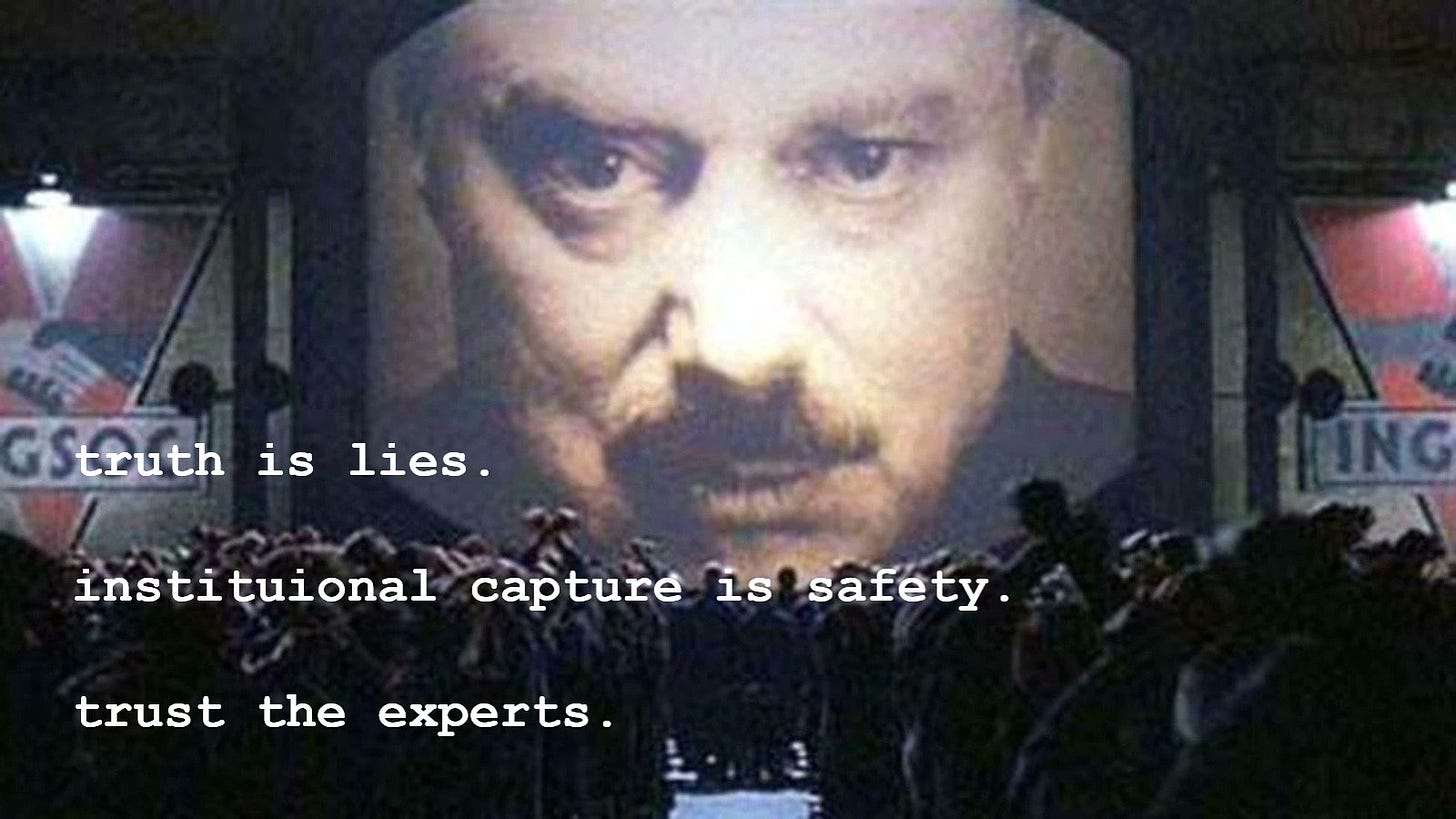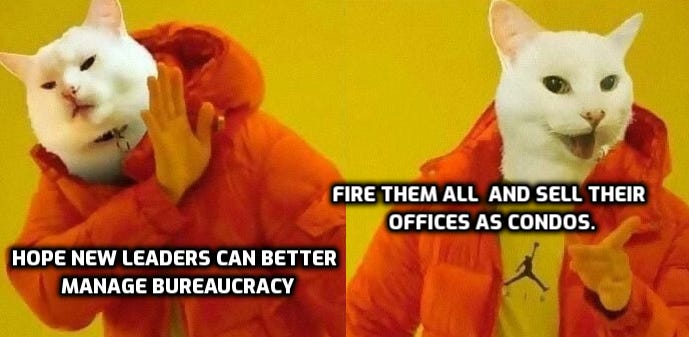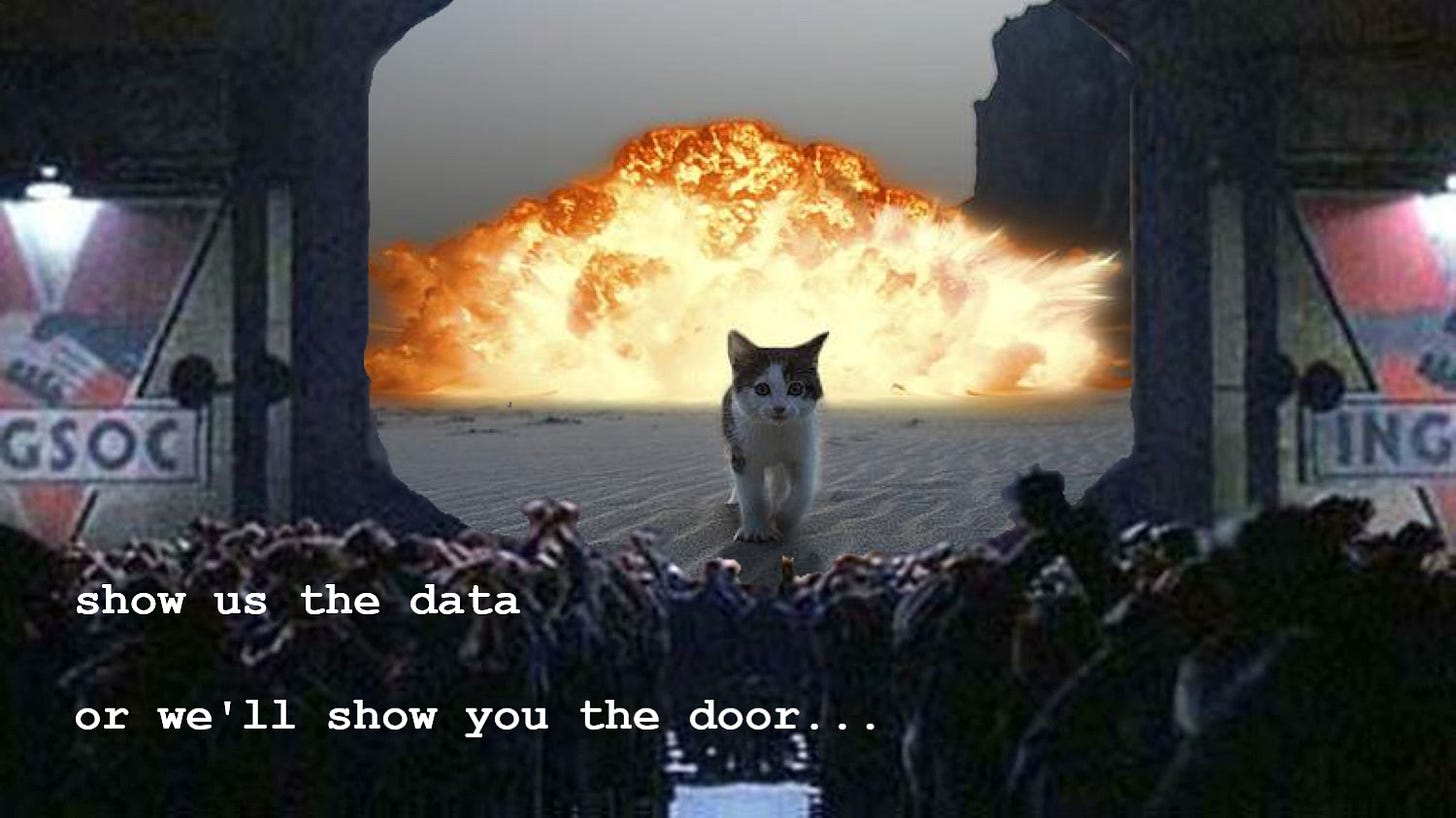we inhabit an astonishing time when ever more of our lives and livelihoods are affected by increasingly opaque and unaccountable agencies and systems of technocracy.
they collect the data upon which we rely to render opinions.
they analyze that data to tell us what it means.
and decisions of expansive reach and great moment are made based upon it.
and yet it’s nearly all a black box.
we only see what they want us to see and time after time, they get caught fiddling the figures, making stuff up, using bad math and worse analyses, and cancelling or adulterating every data series that goes against their chosen narratives and pathways.
then they wonder why we won’t trust them.
they empanel blue ribbon committees on “misinformation” as though the problem is just that they are not appealing to enough authority, stifling enough speech, and censoring enough people.
these "misinformation" summits are the death rattles of an embattled clerisy desperate to reclaim its shattered credibility.
but it does not work like that.
doubling and tripling down on the selfsame shenanigans that got us here is not going to work.
everyone has seen this movie before.
they know the ending.
“At the summit, Nobel Prize laureates and other experts will be joined by information technology and business leaders, policymakers, journalists, educators, and youth from around the world for a global discussion to explore solutions to actively combat the spread of misinformation and disinformation, share evidence-based knowledge and global experiences, and help restore confidence in science and systems of society.”
oddly, nowhere on the agenda of this august assemblage of academic info-assassins will the topic of “hey, what if we just stopped lying all the fricking time?” be raised.
“what if we were more open and honest and allowed and encouraged competing parallel assessments to challenge or verify our own?” also seems a question likely to go begging
and therein lies both the problem and the solution.
these bureaucracies and technocracies cannot be trusted and that problem is structural.
left alone and unsupervised, they will always and everywhere become their own core constituencies. it’s an inevitable emergent property of such systems. they will be captured by partisans and crony corporatists alike. they will serve “they the bureaucrats” instead of “we the people” and this is clearly not working and the further public trust erodes, the more conflict this is going to drive.
you cannot get “better people next time” or “clean house.” the institutional incentives remain and they will get you the same outcomes. no matter what you deracinate today, so long as we leave the systems in place, this garden will always grow nothing but weeds tomorrow.
you guys by now likely know my base prior on most of this which is approximately:
but even at this level of provocation, i suspect that simply too many people are too wedded to the idea that “whatever agency hobbyhorse i have is needed and we cannot let people make their own choices about health/drugs/climate/whatever” to make “bulldoze it, pave over the remains, and never ever let it grow again” politically practicable.
they want these agencies and are not ready to consider a world without them.
and so let me play “politics cat” and engage in “the art of the possible” here for a moment because i believe that i have a simple, straightforward proposal that could radically change the way public technocracy functions by making a simple, attainable change:
all data collected by public agencies and regulators must be wholly open to the public.
period.
that’s it. simple, sensible law that seems like it ought to be attainable.
massive reach.
no data may be siloed. you collect it, you share it. apart from anonymization to remove personally identifiable information, nothing may be withheld.
if the FDA wants to approve a drug, we get to see every record used in that drug trial.
if the CDC wants to collect health data and use it to make recommendations, we ALL get to see all of it all the way back to the source material.
if the EPA/NOAA want to tell us the temperature or the harms from some purported pollutant, every scrap of raw data right down to the serial number on the thermometer, every study, every adjustment, and every rationale must be made public.
all private research funded with public money must be open and transparent to the public. no more “we pay, you keep” gold giving and no more “hide the dodgy stuff in places no one gets to see/oversee.” if this is work in the public interest, let the public be the judge of that.
we get to see every analysis, algorithm, and statistical technique, every raw reading and datum.
we get to check everything.
open source or get lost.
congress will instantly defund any agency that fails to comply.
this data belongs to we the people. so give it to us.
let us check your work and validate claims.
open yourselves up to REAL peer review not this clubby clownshow that winds up amounting to nothing but:
dear agencies:
if you are for real, you should WANT this.
i suspect many of those who work there do and are as sick of the political puppetshow dominating their workplaces as we are of dealing with it.
help us get back to doing real work.
this is how you get the right answer. this is real scientific method.
unless your goal is something other than truth, what’s the argument to deny this basic foundational aspect of truth seeking?
it’s not private data. you did not pay for its collection, we did.
so why can’t we see it?
something has to change. the current situation is clearly untenable.
we don’t trust you anymore and no new campaign of expert worship, credentialism, or censorship is going to change that.
if you want trust, you need to start acting trustworthy.
if you want to fight “disinformation” do it with “information.”
do it with discourse and lively, wide ranging adversarial assessment of competing hypotheses where EVERYONE and not just the anointed get the data.
that is the process of science, not preferential and curated “peer review” by selected pals, but replication and refutation.
and then we can see for ourselves if you are trustworthy and sage.
and if you won’t do it, then why on earth should we pretend that you are?
why on earth would anyone want to play another round of this calamitous game of “close your eyes and open your mouth” with the black boxes of “the experts” who have proved themselves as inexpert as they are untrustworthy and sought to compensate for it with censorship?
you guys blew it.
and that bell cannot be un-rung.
but the future can be better.
if you want to be treated like scientists, then act like them. allow interrogation and confirmation. stop acting like some sort of data cult where only the initiated may see the mysteries.
trust through verification.
what other serious option is there?
l









One hundred percent, a great article... There's a saying - The truth welcomes questions a lie does not like challenges - obviously not a direct quote here, but along those lines... The west has slowly lost what remains of free speech, debate is no longer allowed, a group of (frequently incompetent or corrupt) experts will tell you the truth and how to think. Funny how a large chunk of society swallowed this bullsh!t, when there were enough evidence that a lot of the "truth" they were peddling was plainly lies. Even science was proving them wrong, yet you "went against community standards " if you shared unfavorable research on social media that went against the narrative. I mean it went so far that Facebook"fact checked" the British Medical Journal !! Now they need a conference on restoring trust stopping the spread of misinformation? It's a total joke (a joke that isn't funny).
https://www.bmj.com/content/376/bmj.o95
If public institutions want our trust, maybe they could try not lying so much?
I know, that's crazy talk.